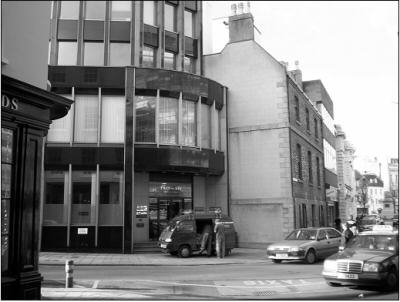|
|
The Channel Islands and the Great War
|
|
POUR LA
PATRIE
The Mobilisation of the French Reservists in Jersey: August
1914
By Ian Ronayne
|
Monsieur Jouve was the French Consul in Jersey, and a well-known
figure in the Island's establishment. He must have received
the news with a heavy heart - despite it not being unexpected.
His duty however was clear, and he set about exercising it immediately.
Notices were placed throughout St Helier: at newspaper offices,
in French cafes and at the Town Hall. At the same time, the
news was relayed to priests administrating the Island's French
Roman Catholic churches with a request that it be read-out at
mass that evening, and again at Sunday's services. But most
importantly, he sought the assistance of the Island's Parish
Constables. Understandably, most French lived in the country,
and help would be needed to make sure all were made aware of
the news. So, throughout that evening, and into the next day,
Parish officers went from farm to farm passing on the news to
all they found, and informing them of their obligations.
The instructions were unequivocal: starting the next day, all
eligible Frenchmen were to present themselves at the offices
of the French Consul without delay in order to obtain passports
and arrange passage. Furthermore, they were to be ready to leave
the Island immediately if necessary.
|

The site of the former French Consulate
in St Helier's Church Street
|
In 1914, the French Consulate building was located in
St Helier, at No 2 Church Street. It stood on the junction
with Library Place, opposite one of the entrances to the
Royal Square. By 10.00 am on the morning of the 2nd August,
the road outside, and the thoroughfare opposite, was packed
with an excited and noisy crowd. Several hundred people
were present: a mix of reservists, their families, and
curious onlookers. More were arriving all the time.
It was a spectacle "not to be forgotten",
reported one newspaper, "young and middle-aged Frenchmen,
filled with the fire of enthusiasm, all anxious to rejoin
the colours and, if necessary, to fight for the honour
of their country had assembled there." Whether they
were all "full of fire" is perhaps questionable,
but nevertheless, they were admitted to the office in
batches and emerged shortly after clutching the appropriate
passports and travel documents.
St Helier's harbour was only a short walk away from Church
Street and many of the reservists went straight there
after leaving the Consul. At noon, the first group of
88 departed for France on board the SS "Laura",
bound for the port of Granville, and in the afternoon
another party left on the SS "Jersey" for Carteret.
|
It was clear however that the majority of men would leave the
next day, having packed and settled their affairs. To cope with
the anticipated exodus the harbour authorities laid on an extra
vessel: the SS "Alberta". But they weren't the only
ones making plans for that day. Monday, 3rd August was a Bank
Holiday in Jersey and many Islanders decided to come down to
the harbour in order to watch the reservists depart. By midday
they packed the upper walkways of the Albert Pier, and also
gathered in great numbers on the quay itself around an area
cordoned off to allow the men to board the ship.
| Regrettably, no plans had been
put in place to separate the curious from the families of
departing men, and as a consequence, the reservists were
forced to share their final intimate moments amongst the
jostling crowd. This was a shame given the poignant circumstances,
as reported in the Jersey Evening Post the next day:
"Many pathetic scenes were witnesses on the quay.
In several cases a man had to say goodbye to wife and
family, or the aged parents all dependent on him, and
these partings were of such a tender nature and were accompanied
by so much emotion that but few of those in the crowd
could watch them unmoved… In one instance a father
had to say goodbye to his wife and seven children…In
another case a reservist had to leave his wife who is
seriously ill. There are, of course, numerous cases where
husbands are separated from their wives, and these partings,
as can well be understood are heartrending to watch."
But there was to be no exceptions. The issuing of passports
and the departures continued throughout the day, and into
the next. By the time the final men left on the 4th, the
news had come through that war had been declared between
Germany and France. For the French families left behind
in Jersey, the news must have dashed any hopes of a quick,
safe, return for their loved ones. They could now only
wait for a letter or telegraph, and pray that it was not
from the War Office.
|

August '14: The scene at St Helier's Albert Pier
as the reservists leave for France (Societe Jersaise)
|
How many reservists left Jersey in those frenetic early days
in August is not certain, but a report in December 1915 states
that 2,450 Frenchmen had left to rejoin the colours by then.
Given the nature of their work, it would be reasonable to assume
that most Frenchmen in the Island would have been of military
age; it would seem likely therefore that the majority of this
number left at the start of the war.
Page 1  |
Page 3  |
|
|